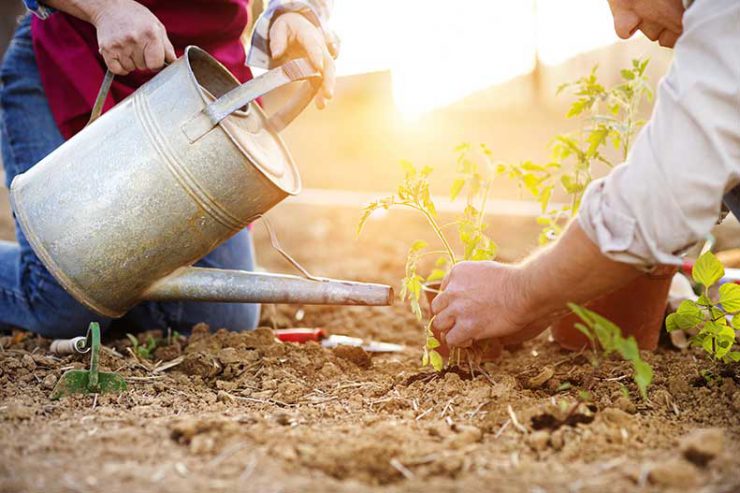5 Tips for Maintaining a Healthy Garden

When a plant contracts a fungus, it becomes one of the most perplexing events in your backyard. What caused it? Is it going to get worse? Do all of my plants have a chance of surviving? What is the only way for me to get rid of it? The disease triangle is the most important concept to grasp when thinking about disease prevention (drawing, right). Just three elements must come together for disease to occur: a sick plant (a host), a pathogen (such as a fungus, bacterium, or virus) that can attack the plant, and disease-promoting environmental factors (such as humidity or drought). The illness would not occur if all of these factors are missing, so avoidance entails removing at least one side of the triangle. Find the safest defense against disease to be a successful offensive, rather than waiting for a threat to arise in your yard. Here are five ways to keep the plants safe by eliminating at least one side of the disease triangle.
Before purchasing seeds, closely inspect them
The only way to keep disease out of your garden is to prevent it from getting there in the first place. Getting a disease from a new plant isn't something any of us needs as a perk. Knowing what a good plant might look like is one of the most difficult things to do, finding it difficult to tell whether the one you choose is sick. Collecting a few books, journals, and catalogues that illustrate what a safe specimen feels like is a smart idea. If a plant has dead patches, rotted roots, or flies, don't take it anywhere. These issues can quickly spread to your healthy plants and can be difficult to eradicate once identified. Still inspect the root consistency in addition to the tops of the plants. In a garden centre, one does not always see people doing this, however it should be. Place the plant stem between your fingertips and place your palm on the soil surface. Shake the plant loose by gently inverting the pot. To remove the roots from the pot, you can need to tap the pot's edge on a firm surface. Roots should be firm, white, and evenly spread around the root-ball. Roots that are dark or mushy are not a positive indicator. Even if the tops tend to be stable, a rotten root system can eventually destroy a vine. You must keep garden clean by metal vs plastic rake.
Make use of yard waste that has been thoroughly composted
In a compost pile, not all materials decompose at the same time. Some products have degraded to the point that they can be used in the greenhouse, while others have not. Composting produces high temperatures over long periods of time, effectively killing any bacteria in the material. Infected plant residue that hasn't been through this phase will reintroduce disease to your yard. If you're not sure how your compost pile is doing, don't use yard waste as mulch around sensitive plants, and don't put potentially contaminated debris in your pile.
Keep a close watch on the pests
Insect damage to plants is more than just a cosmetic problem. Viruses and bacteria may only invade a plant through an opening, which is also provided by bug destruction. Any insects serve as virus carriers, transporting viruses from one plant to the next. Aphids are a common vector, and thrips transmit the impatiens necrotic spot virus, which has been a major concern for commercial growers in the last decade. Aster yellows (right photo) is a disease spread by leafhoppers that affects a wide variety of plants. Insect attacks are another way to stress a plant, making it less able to resist disease.
In the autumn, clean up
Even if you live in a mild environment, it is still better to dust out the garden in the autumn. This is not only an excellent disease deterrent, but also a safe way to contain diseases that have already established themselves in your garden. Diseases will overwinter on dead leaves and debris and infect newly emerging leaves in the spring. Iris leaf spot, daylily leaf streak, and rose black spot are only a few of the diseases that can be greatly minimized by removing the dead leaves each fall with metal vs plastic rake any one you want to choose on. If you're keeping stems and leaves up for winter interest, make sure to take them down before new growth begins in the spring.
Use the right fertilizer
When fertilizing plants, be cautious since too much fertilizer will burn the roots, limiting their ability to absorb water. As a result, the plants are more vulnerable to drought, cold, and heat stress. Plants that are deficient in nutrients are weaker and more susceptible to leaf stains, while a healthier plant can fend off disease. Another way to stress a plant is to give it so much of a certain nutrient. You can get correct statistics on nutrient levels in your soil by getting a soil test from your local extension office. Without it, feeding the plants would almost certainly be a guessing game, resulting in too much of one nutrient or not enough of another. Check out metal vs plastic rake.

French leader: Trump administration poses challenges for Europe weaky
- Hollande highlighted trade and diplomacy in global conflicts as areas for concern.<br><br>"There are

Romanian president faces impeachment koch
- Romanias leftist government began impeachment proceedings Wednesday to suspend President Traian Bas

Arsenal go top as Manchester City up to second with win over Liverpool interjaculating
- Arsenal returned to the top of the English Premier League Thursday as previous leaders Liverpool sli

Spain edge past stubborn Italy to create dream final with hosts Brazil medal
- Reigning world and European champions Spain set up the purists dream Confederations Cup final again